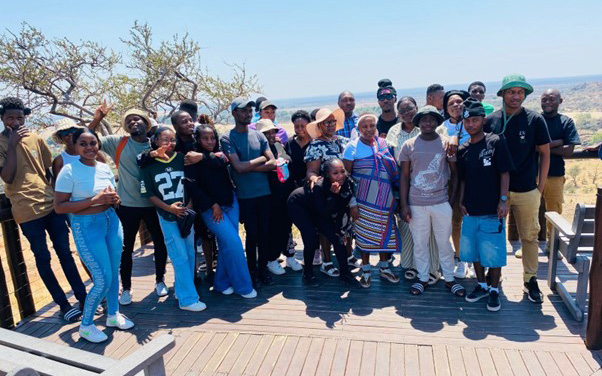Connecting university theory to heritage sites like Mapungubwe and Dzata Ruins

The Department of Indigenous Knowledge Systems and Heritage at the University of Venda organised an essential educational excursion for its third-year students during Heritage Month, visiting two significant historical locations: the world-renowned Mapungubwe Heritage Site and the locally important Dzata Ruins. This practical trip was necessary to allow students to link their theoretical coursework with the physical reality of heritage preservation, and it was guided by key academic leaders from the department.
Key details of the heritage field trip
- Institution: The trip was organised by the Department of Indigenous Knowledge Systems and Heritage at the University of Venda (Univen).
- Participants: The excursion included third-year students (level three) studying within the heritage programme.
- Staff Leadership: The trip was led by the Head of Department, Dr. Tshimangadzo Makhanikhe, alongside faculty members Dr. Ndidzulafhi Ramavhunga and Dr. Livhuwani Tshikukuvhe.
- Locations Visited: Students visited the Mapungubwe National Park and World Heritage Site and the Dzata Ruins.
- Timing: The field trip took place during South Africa’s designated Heritage Month. (The image metadata suggests this event occurred around October 2025, providing a specific timeframe for the academic activity).
- Purpose: The main goal was to provide hands-on experience in heritage conservation and to demonstrate the practical application of indigenous knowledge systems studied in the classroom.
Simple summary of the story
To celebrate and educate during Heritage Month, the University of Venda’s Indigenous Knowledge Systems and Heritage department decided that the best way for their third-year students to learn was through direct experience. They planned an important field trip to two pivotal historical sites in the region: Mapungubwe and the Dzata Ruins. The delegation was well-staffed, ensuring the students received expert guidance from their lecturers, including the Head of Department, Dr. Tshimangadzo Makhanikhe, Dr. Ndidzulafhi Ramavhunga, and Dr. Livhuwani Tshikukuvhe.
The visit to Mapungubwe is vital as it is recognised globally as a World Heritage Site, representing an ancient South African kingdom that existed over 700 years ago and is famous for its advanced social structures and the discovery of the Golden Rhino. By walking the actual grounds and observing the conservation efforts, students gained a deeper understanding of large-scale site management and the challenges involved in preserving global history.
Similarly, the visit to the Dzata Ruins provided context on local history and traditional Venda heritage, complementing the broader historical view gained at Mapungubwe. These visits are central to the course curriculum, bridging the gap between lecture notes and the real responsibilities facing future heritage professionals. The department believes that this practical exposure is crucial for the students’ development, preparing them not just academically, but also practically, for careers in conservation and cultural management.
You can read the original report from Univen for more information about the excursion.
Questions and answers for the community
- Why is it important for students to visit these sites physically instead of just learning from books?
Visiting the sites provides a crucial connection between theory and reality. Students can see the scale of the ancient kingdoms, understand the environmental challenges of preservation, and gain respect for the cultural landscapes, which is difficult to achieve solely in a classroom. - What is Mapungubwe, and why is it so important to South Africa?
Mapungubwe was the capital of a prosperous kingdom between 1075 AD and 1220 AD, predating the Great Zimbabwe Empire. It is important because it proves that sophisticated societies existed in Southern Africa long before colonial contact, and it is a UNESCO World Heritage Site. - Who were the lecturers that went on the trip?
The trip was led by the Head of Department, Dr. Tshimangadzo Makhanikhe, and two other respected lecturers, Dr. Ndidzulafhi Ramavhunga and Dr. Livhuwani Tshikukuvhe. - How does the study of Indigenous Knowledge Systems (IKS) relate to visits to ruins like Dzata?
IKS involves understanding how traditional communities managed resources, organized their societies, and conserved their environment. The Dzata Ruins are a primary example of Venda heritage, allowing students to study indigenous architecture, governance, and spiritual practices in their original context. - Will these field trips help the students find jobs after graduation?
Yes, practical exposure to site management, conservation protocols, and community engagement at real heritage sites is highly valued by employers in museums, government heritage agencies, and national parks, making the students more career-ready. - Is there a link between this university department and local community projects?
The department is focused on Indigenous Knowledge Systems, which often requires close collaboration with local communities, traditional leaders, and custodians of heritage to ensure preservation efforts respect cultural protocols and benefit the local people. - When is Heritage Month in South Africa?
Heritage Month is celebrated every year in September, culminating in Heritage Day on September 24th.
To discover more stories happening in our region, please check out our local news section.





